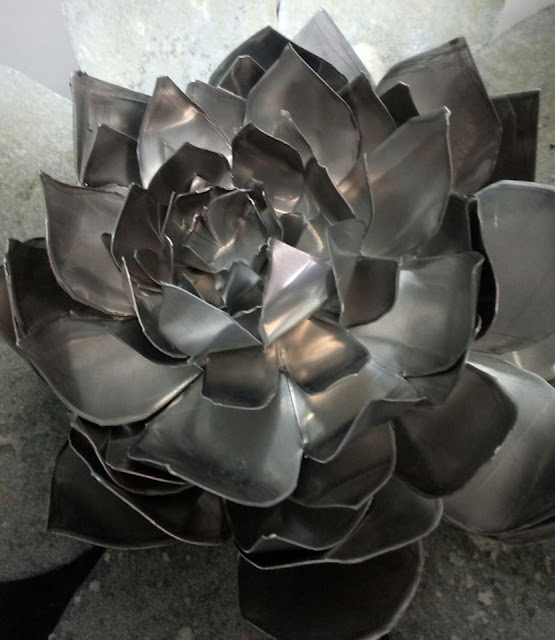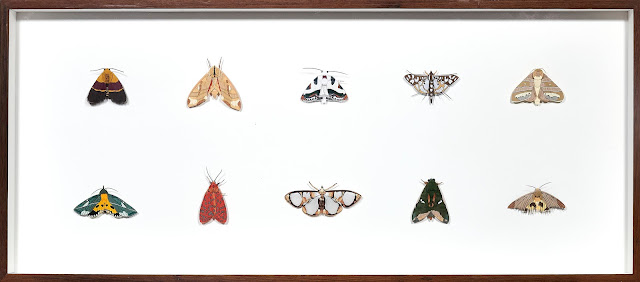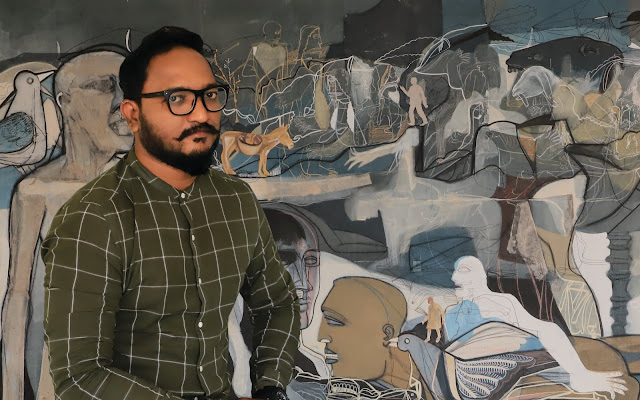Harshda Nirgun, an
alumni of J.J. Schools of Fine Arts is conducting a solo Exhibition at Nippon
Art Gallery, near Kala Ghada, Mumbai from 10th to 15th December 2019. The
exhibition is free for entry and is based on experiences of life, natural
harmony, womanhood and growth of society .The artist aspires to increase
awareness and maximum inclusion of people from different age group to experience,
understand and spread the message.
My artwork captures glimpses of the current state we live in, the
visuals that I believe to shake us to our core and awaken our restrained
emotions. It’s linked with my life experiences and my identity in our society.
 |
| Artist : Harshda Sadanand Nirgun |
When I am in the process of creation I tune with my inner self, work
with my intuitions, everything in my surroundings gets blurred and I just deep
dive with myself, add colour to my feelings and express it, its not always planned, it just happens. My artwork is similar to an
onion, layers upon layers covering the inner emotions. My efforts are to
express everything I see, the myriad waves that I feel and try to collate them
in my artworks. At times I also detach from myself and observe it as a third
person, it kind of makes you think and new perspectives and answers just reach
out to me.
Being an Artist one
doesn't have to perform any kind of stunts it should be your experiences,
feelings and your way of expression. It doesn't have to be in particular way or
adulterated with outer manifestations. It has to be open and free of any glass
ceilings and limitations.
Other mind jolting work is my Street art for Kalaghoda installation
based on Corruption. I have installed a life size match box, with sides made of
currency bundle. There is only one stick standing symbolic of an individual’s
fight while Inside of the matchbox are burned sticks that came in contact and
burned due to the friction of the never ending greed of “human want”. This
artwork was inspired from a real-life event in my kitchen which I related with the corruption and greed in the
society.
My other works are related to human relations from women’s perspective.
Women is the giver of life and it’s linking with mother earth. How in the name
of progress we are disturbing the natural balance of other animals and birds
and destroying the beautiful nature in our surroundings.
Regarding my current solo exhibition in Mumbai
The very existence of any
particular thing, living or non-living, is in its existence within that time,
it’s the momentariness, the fleeting moment that lets us glance the substance
of life. The interrelated expression, the flash realisation, the static
imprints. It’s outer conditions and surging inner situation merged in the state
of trance, that evolve out of it. Unspecific certainty with its own grace without any external force acting on it.
There is an outer shield, which
hides the core idea engrossed in captivated experiences. Nothing to
oppose, nothing to support, as it cannot be shared or explained. Those endless
stories, travel, brief moments, that eagerness and its volume can only be felt.
My artwork captures these
glimpses of the current state we live in, the visuals that I believe to shake
us to our core and awaken our restrained emotions. It's linked with my life
experiences and my identity in our society.
Few more
of my works in the current exhibition:
v Living Halt:
An
interactive installation where you can actually stand amidst the scaffolds and
experience a Halt at a construction site. Architecture has a life too,
it’s state continually changes as it endures external elements and requires
routine maintenance just as our skin.
v Parallel I:
Three
adjoining spheres depict parallel memories of past, present, and future. Living
and breathing without knowing each other like insects crawling in their
own little world, unknown of the nearby worlds but connected in space.
v Parallel ll:
Play of
shadows, objects with multiple overlaps, changing their forms with moving light
source with passing of time.
v Under construction Bride:
Photograph
of myself in a green construction cloth as saree, keeping Indian 'Ghoongat',
it's new development in progress on old roots, progressing ahead and restructuring
for better future.
v Inside out:
A
glasswork displayed with metallic Lotus. To know yourself inside-out the
blissful inner core and the flow of energy within, transforming and evolving
through different experiences.
v Reality Check:
A rusted
Lotus symbolizing the transition period of a city from old to the present
progressive state leaving it's murky scent behind as it transforms.
v Esteem:
The
composition consists of construction worker’s hands signifying hardship that
goes into making others dreams a reality and keeping their younger generation
alive.
v Dream Home:
Creation
of personal-space to dwell is a structuring of our own physical and mental space.
v Noise:
A visual
noise of construction and continuous reengineering of the surrounding that
overlaps and blocks the tranquil chirp of a ‘City bird’
v Reach:
Constant
human interference effects the navigation of migratory and local birds. They
get stressed and disturbed by heavy noise pollution created in the city area. A
composition with the mating call of Cuckoo bird is suppressed by cement mixture
machines and road roller.
No one teaches you art it comes from within though I am an academic
Masters in fine arts from Mumbai. I have
always found different ways and mediums to
experiment and express my work. Looking forward to inspire young minds
to respect mother earth, women, expand their thoughts beyond the horizon and
include everyone in their growth.
Deval Chambers 30/32
2nd Floor, Flora Fountain
Nanabhai Lane, Kala Ghoda
Fort, Mumbai, Maharashtra 400001




















